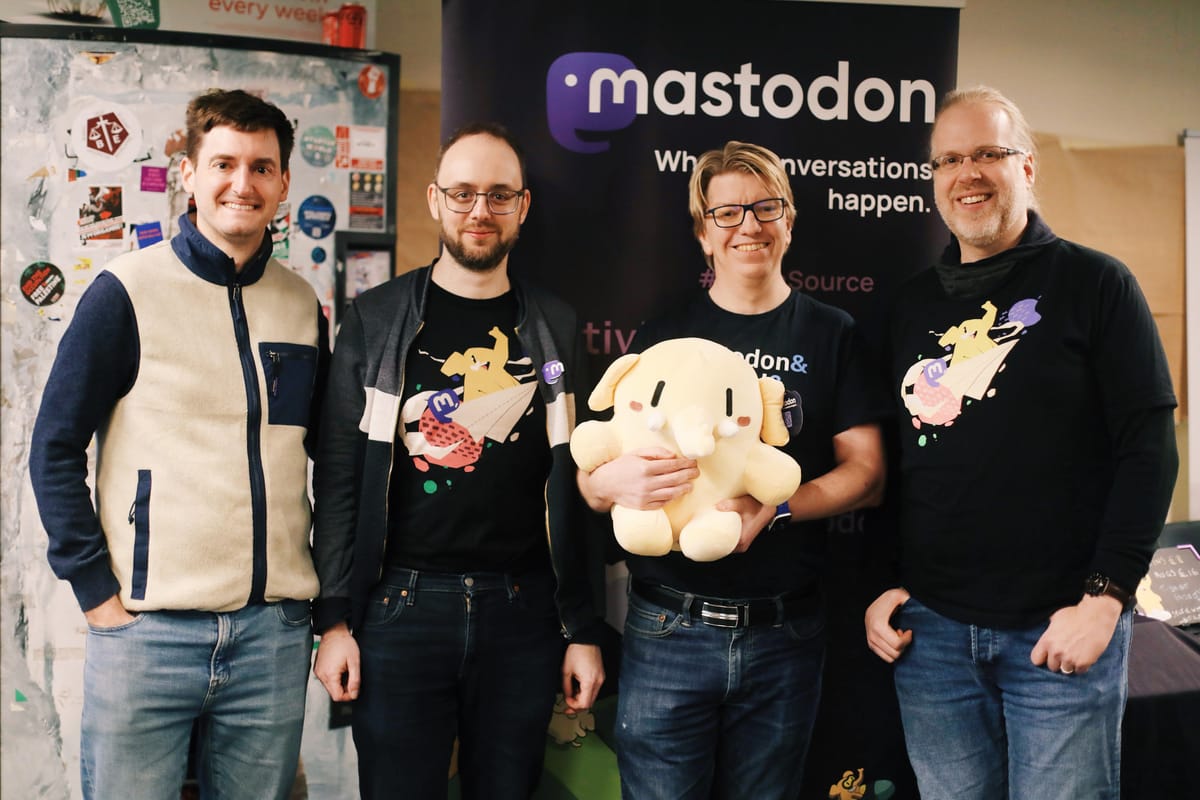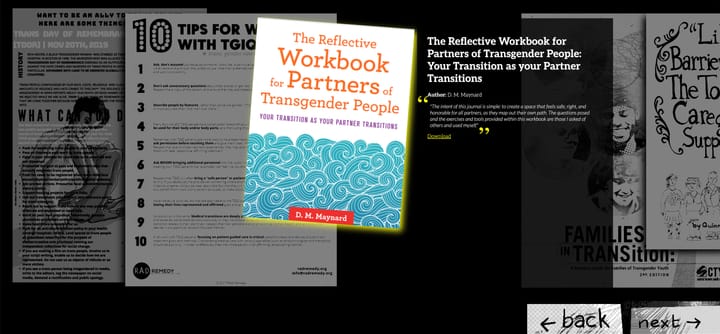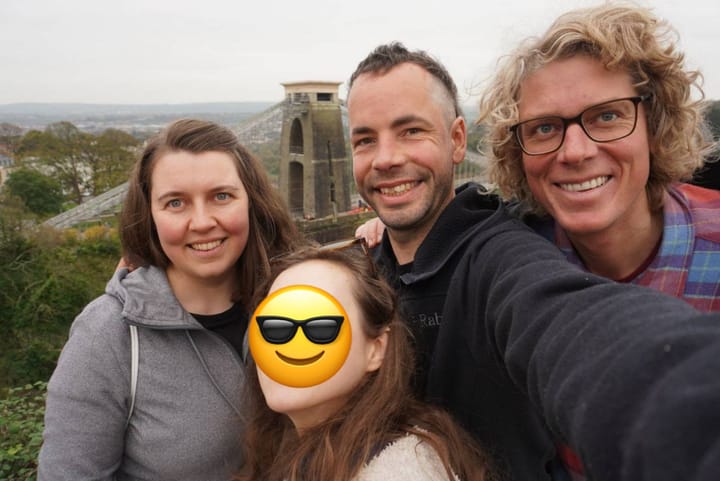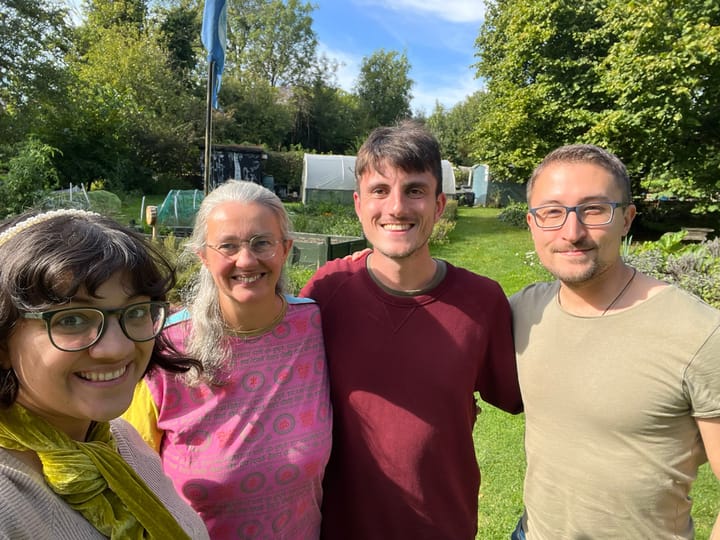Community Spotlight: Mastodon
Kim caught up with Andy, Mastodon's new comms lead, for a chat about the Fediverse's poster child. Find out more about the future of the project, how they feel about Bluesky, and how you can get involved.

So the big question I know we all struggle with: what is Mastodon? I have my own answer but I would love to hear it from the horses' mouth!
Mastodon is a user-first social platform built on principles of community independence and shared governance. It is free, decentralised, and based on an interoperable open standard. We're user-first because we're not tracking usage and pushing irrelevant content - you are in control of what you see.
You can post short updates to share with your community, and read and interact with other people's conversations. Similar to some other platforms maybe, but we are user-funded, have no algorithm, no tracking, and, being decentralised means that no one individual can buy and own (and, let's say, unduly influence) the network.
Mastodon is the largest member of a broader ecosystem known as the “Fediverse” – or “federated online universe”– with different apps and platforms where users can all see and interact with posts even if they are not using the same app.
How did you get involved with the project, and what's your role now?
I've always been interested in social networks and social platforms online, going back decades I used mailing lists, bulletin boards, online communities and spaces – plus, I use and care about open source software. I worked at a company called Twitter for a number of years and it was great... until that company got destroyed and replaced with something different!
After that happened, I wanted to help this open source project to build a community for developers, so I started consulting with them one day a week in a “developer relations” role. Now I'm running Communications for the Mastodon organisation as a whole – everything from blog posts, social updates, public speaking, and meeting with policy makers.
What are the current main objectives for the organisation? How are you structured and how do people decide priorities?
Great question. It has been a pretty big change over the past couple of years.
A few weeks ago we posted a blog post about our non-technical objectives for 2025. They might seem a bit dull: establish a foundation / restructuring, platform growth, and financial sustainability. The fact is that we're making some big adjustments at the moment to ensure that no single individual owns Mastodon, because it is important for people to own their own social networks. So, as we speak right now, Mastodon is an open source software project, and it is a company in Germany that employs some people to work on it and to run a service that people can join. This year we are forming a new non-profit based in Europe that will own the trademarks, assets etc on behalf of the community. The company will still exist to do a few necessary things like running the service or offering support (that will also support the sustainability goals) but the governance is changing.
In the past 6 months the main team has grown to around 10 full time employees, and the most recent release of the software (version 4.4) really reflected that we've got new skills and expertise working on areas like usability and our user interfaces.
I also want to mention that while we're keen to make the software better and easier, we also want to make social software that is overall more healthy to use. We are not owned or funded by venture capital and we do not want to be. We do not want to have ads in Mastodon. This all means that we are not driven by goals around “user engagement” in order to sell your eyeballs to the highest bidder in an ad market. So, we don't need an algorithm that optimises for showing outrageous content to hold your attention. We can make a calmer, healthier, nicer social platform. When there's no more to look at in the timeline, we're not going to shove more in - you can (and should) go and do something different, instead.
We've talked about how it's a strange thing for people who otherwise only use corporate software to get their heads around say, “Wordpress” being both a piece of software, and a website you can go to to host a blog. I think Mastodon struggles with this even more as people have no frame of reference for what it is. How do you tackle this?
Right. Self-hosting or community hosting is very very powerful, but it is also generally still the realm of folks who have a certain level of technical knowledge, and that's a barrier.
We have a server – mastodon.social – that anyone can join and use (assuming they like our rules), and the team takes care of keeping it all working, and you just login and use it. Very similar to email or anything like that. If you want to run your own thing, on your own web domain, you can do that – I'm @[email protected], for example – and I can still talk to people with accounts on mastodon.social. It means that if your server changes somehow in a way you don't like, you don't lose your network and can move your account somewhere else.
It is actually really important for resilience and cultural variety that many Mastodon servers exist, in many places all around the world.
I'd say currently Mastodon has a few communities that are very overrepresented – mostly techie people and trans people actually – and a lot that are not represented at all. Do you have a plan to reach people who are politically aligned with Mastodon's goals, but for whom the tech is too off-putting?
One of the great things about Mastodon and the Fediverse is that many of the people that have contributed to it are from groups that are otherwise underrepresented culturally, so it has some nice features that directly reflect that - for example, it tends to have a strong focus on accessibility with text descriptions for images.
In terms of a plan, well... it's a plan that actively evolves! We are actively discussing having more governments and civic institutions using open platforms for their communications to that a commercial interest cannot interrupt or restrict them, and those conversations are pretty strong in the EU, for example. We're also aligned with other foundations, organisations and movements who want to provide better, non-extractive solutions for communities.
A couple techie questions. I think Mastodon is synonymous with ActivityPub, the protocol that powers it. Can you talk a little bit about this underlying technology and how it feels being the poster child for it?
It's great to have an open standard to work from.
I won't go into extreme depth on the history of ActivityPub, but it emerged from a few other protocols, and Mastodon adopted it in 2018. It is managed by the W3C, the same organisation that looks after the standards that make up the web itself, so it is often talked about as being the open social web protocol.
The ActivityPub ecosystem - the apps and platforms that use this format for communication - continues to grow, so now there are tools that let you manage your reading habits, share photos, live stream video, manage 3D printing catalogs, all kinds of different things, and they can all work together. Mastodon gets to benefit from all of that development.
How do you feel about Bluesky and ATProto? I'm finding it hard to get my head around a project that has one foot in the Silicon Valley world and another in the (at least on paper) open standards world. Do you think there's space for two open protocols?
There does not need to be a single “winner” here. Technically, right now ATProto (the protocol that Bluesky is built on) is not a ratified standard though! ActivityPub is, and has been around for a decade, and has a strong ecosystem.
I feel good if people are able to build sustainable systems that respect their rights, data, and choices, and I feel good when people make the choices to use the open options. I think we have some questions and concerns around the directions Bluesky itself may travel in the future, but certainly no hard feelings towards the platform itself.
What do you think the future is for the Mastodon project? What will things be like in 1, 5 and 10 years?
In a year, we will have our new organisation fully formed and working on the next improvements. In 5 and 10 years, I hope we will see many more systems interconnecting as part of the Fediverse, with more people feeling confident about where their information is hosted and how it is governed. I hope that Mastodon can be a guiding, positive influence as we grow that story.
How can people get involved in the project?
Right now it's extremely important to grow our funding, and folks can help there by donating! Monthly contributions are particularly welcome as they help us to predict our finances more accurately. There are a range of other ways to contribute: as an open source platform you can (if you choose) contribute to the code, help with the documentation, or add and improve translations. Find out more on GitHub. You can also help by creating an account, using Mastodon, and telling your friends!
GFSC have our own community-managed Mastodon server, https://social.gfsc.studio, that is open to all paid blog subscribers and donors and used by some of our authors and community members. We'll be migrating it to the new gfsc.community domain name in due course.
If you'd like to join, subscribe on this blog to get the invite link, or drop Kim a DM and we can sort you out.




Comments ()